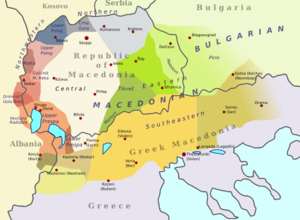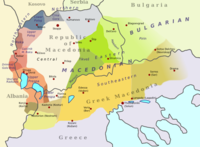
The Nestram-Kostenar dialect (Macedonian : Нестрамско-Костенарски дијалект, Nestramsko-Kostenarski dijalekt) is a Macedonian Slavic dialect spoken in parts of northwestern Greece, in the area around the village of Nestorio (Nestram) and the area known as Kostenarija, which encompasses most of the Nestorio municipality as well as in the Akrites region. There are also speakers in the adjacent Devoll District of Albania.
The Macedonian language is a South Slavic language spoken as a first language by around two million people, principally in North Macedonia and the Macedonian diaspora, with a smaller number of speakers throughout the transnational region of Macedonia. It is the official language of North Macedonia and a recognized minority language in parts of Albania, Romania, and Serbia.

Nestorio (Greek: Νεστόριο, Nestório; Macedonian: Нестрам ; Bulgarian: Нестрам and/or Нѐсрам is a village and a municipality in the Kastoria regional unit of Macedonia, Greece. Nestorio is approximately 28 km southwestwards of Kastoria, at the banks of the river Aliakmon.
The Nestram-Kostenar dialect shares strong similarities with the adjacent Kostur (Kastoria) and Korča/Gorica (Korçë) areas. Vidoeski (1991) classifies these dialects as members of a south-western subgroup of the southern group of Macedonian dialects. [1] Stoykov (1962) in his work on Bulgarian dialectology describes them as subgroups of the Kostur dialect. [2]

The Kostur dialect, is a member of the Southwestern subgroup of the Southeastern group of dialects of the Macedonian language. This dialect is mainly spoken in and around the town of Kastoria, known locally in Macedonian as Kostur, and in the surrounding Korešta region, which encompasses most of the area to the northwest of the town. The Kostur dialect is also partially spoken in Albania, most notably in Bilisht and the village of Vërnik (Vrabnik). The dialect is partially preserved among the descendants of Muslim immigrants from the region of Kastoria in Turkey.

Korçë is a city and municipality in southeastern Albania, and the seat of Korçë County. It was formed at the 2015 local government reform by the merger of the former municipalities Drenovë, Korçë, Lekas, Mollaj, Qendër Bulgarec, Vithkuq, Voskop and Voskopojë, that became municipal units. The seat of the municipality is the city Korçë. The total population is 75,994, in a total area of 805.99 km2 (311.19 sq mi). The population of the former municipality at the 2011 census was 51,152. It is the sixth largest city in Albania. It stands on a plateau some 850 m (2,789 ft) above sea level, surrounded by the Morava Mountains.

Stoyko Ivanov Stoykov was a Bulgarian linguist.







